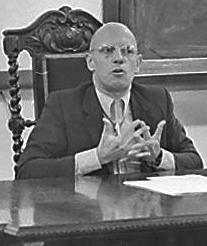Michel Foucault Frases famosas
A Ordem do Discurso, p.44"
A Ordem do Discurso
“Édipo não se cegou por culpa, mas por excesso de informação.”
Œdipe ne s'est pas crevé les yeux par culpabilité, mais par excès d'information
citado em reportagem de " Le Monde http://www.mre.gov.br/portugues/noticiario/internacional/selecao_detalhe3.asp?ID_RESENHA=152810", intitulada "Lula était le "sauveur du peuple", il ne l'est plus : le blues des intellectuels et des artistes face aux scandales", Data: 30/07/2005
“As luzes que descobriram as liberdades inventaram também as disciplinas”
na obra "Vigiar e Punir", página 183, de Michel Foucault, Editora Vozes, 1998; citado em "Modernidade e Dominação" - página 105, de Sílvio Cesar Camargo, Publicado por Annablume
Frases sobre o tempo de Michel Foucault
...
FOUCAULT, M. As Palavras e as Coisas. São Paulo, Martins Fontes: p. 9-12.
The Order of Things: An Archaeology of the Human Sciences
Citações de idade de Michel Foucault
La fiction consiste donc non pas à faire voir l'invisible, mais à faire voir combien est invisible l'invisibilité du visible
citado em "Qu'est-ce qu'un espace littéraire?" - Página 31, de Xavier Garnier, Pierre Zoberman, Pascale Hellégouarc'h, Maarten Van Delden - Publicado por Presses universitaires de Vincennes, 2006 ISBN 2842921852, 9782842921859 - 206 páginas
“Os problemas da loucura giram ao redor da materialidade da alma.”
Michel Foucault, início do Cap. 7 de A história da loucura na Idade Clássica.
“Pois toda felicidade não é mais, talvez, que felicidade de expressão.”
citado em "A refração da sombra" - Página vii, de Paulo Cesar Lopes - Publicado por FUNPEC Editora, 2004 ISBN 8587528777, 9788587528773 - 113 páginas
Michel Foucault frases e citações
"Maladie Mentale et Psychologie"
“O novo não está no que é dito, mas no acontecimento de sua volta.”
A Ordem do Discurso, p.26"
A Ordem do Discurso
História da Sexualidade 2
Microfísica del poder
Microfísica del poder
A Ordem do Discurso, p.42"
A Ordem do Discurso
“Chamamos de loucura essa doença dos órgãos do cérebro…”
Voltaire - Dicionário Filosófico In: Michel Foucault, início do Cap. 7 de A história da loucura na Idade Clássica.
Microfísica del poder
No momento em que a dúvida atingia seus perigos maiores, Descartes tinha consciência de que não podia estar louco – sem que isso impedisse que reconhecesse, durante muito tempo ainda e até o mau gênio, que todos os poderes do desatino espreitavam à volta do seu pensamento.(...)"
Michel Foucault, início da Introdução da Parte III de História da loucura na Idade Clássica.
Michel Foucault: Frases em inglês
“What desire can be contrary to nature since it was given to man by nature itself?”
Fonte: Madness and Civilization: A History of Insanity in the Age of Reason
Fonte: The Birth of the Clinic: An Archaeology of Medical Perception
As quoted in Michel Foucault (1991) by Didier Eribon, as translated by Betsy Wind, Harvard University Press, p. 282
Contexto: There are more ideas on earth than intellectuals imagine. And these ideas are more active, stronger, more resistant, more passionate than "politicians" think. We have to be there at the birth of ideas, the bursting outward of their force: not in books expressing them, but in events manifesting this force, in struggles carried on around ideas, for or against them. Ideas do not rule the world. But it is because the world has ideas (and because it constantly produces them) that it is not passively ruled by those who are its leaders or those who would like to teach it, once and for all, what it must think.
“there is no glory in punishing”
Fonte: Discipline and Punish: The Birth of the Prison
Fonte: The History of Sexuality, Volume 1: An Introduction
“The language of psychiatry is a monologue of reason about madness”
Preface to 1961 edition
History of Madness (1961)
Contexto: The constitution of madness as mental illness, at the end of the eighteenth century, bears witness to a rupture in a dialogue, gives the separation as already enacted, and expels from the memory all those imperfect words, of no fixed syntax, spoken falteringly, in which the exchange between madness and reason was carried out. The language of psychiatry, which is a monologue by reason about madness, could only have come into existence in such a silence.
Fonte: The History of Sexuality, Volume 2: The Use of Pleasure
Preface to 1961 edition
History of Madness (1961)
Las Meninas
The Order of Things: An Archaeology of the Human Sciences (1970)
Part Two: 2. The Transcendence of Delirium
History of Madness (1961)
Vol I: La volonté de savoir
An Introduction. NY: Pantheon. Translated from French by Robert Hurley. Page 43
History of Sexuality (1976–1984)
Part Four, Complete and austere institutions
Discipline and Punish (1977)
In reference to Sadism and Masochism, as quoted in Who's Who in Contemporary Gay & Lesbian History: From World War II to the Present Day (2001) by Robert Aldrich and Gary Wotherspoon
Vol. I, p. 101
History of Sexuality (1976–1984)
"What is an author?" (1984)
Part Two: 2. The Transcendence of Delirium
History of Madness (1961)
Lecture 2, January 17, 1979, pp. 45-46
The Birth of Biopolitics (1978)
Fonte: Lectures on the Will to Know (1970), pp. 4-5
Lecture 2, January 17, 1979, p. 36
The Birth of Biopolitics (1978)
Part One: 5. The Insane
History of Madness (1961)
Part Three, The Means of Correct Training
Discipline and Punish (1977)
Fonte: Discipline and Punish (1977), pp. 13, Chapter One The Body of the Condemned
